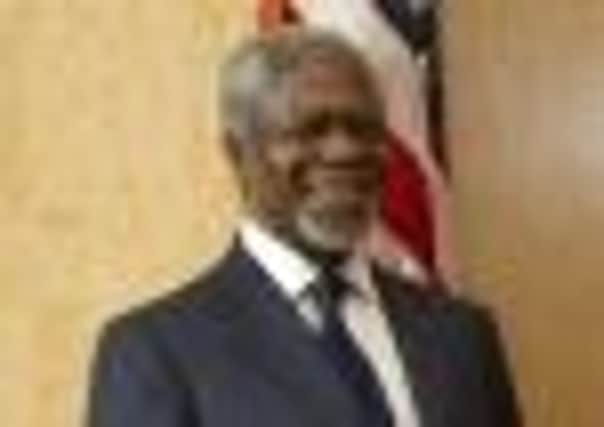Syria: Kofi Annan brokers UN truce


A compromise was reached in Geneva last night by the United Nations Security Council after Russia refused to back a provision that would call for Assad to step down to make way for a unity government.
After the breakthrough, Annan said: “It is for the people of Syria to come to a political agreement. The hard work starts now. We must work together to implement what has been agreed.”
Advertisement
Hide AdAdvertisement
Hide AdEarlier, the talks had seemed likely to fail because of Russia’s refusal to back the demand that Assad quits office.
Annan warned the permanent members of the Security Council – Britain, China, France, Russia and the United States – that if they failed to reach agreement at the talks, hosted by the UN at its European headquarters, they faced an international crisis of “grave severity” that could spark Middle East turmoil and provide a new front for terrorism.
“History is a sombre judge and it will judge us all harshly if we prove incapable of taking the right path today,” he said.
He appeared to specifically aim his words at Russia, Syria’s most important ally, protector and arms supplier.
America is adamant that Assad should not be allowed to remain in power at the top of the transitional government. However, it is feared there is little chance the fragmented Syrian opposition will go along with a plan that does not explicitly say he must go.
Annan said: “While many spoke of united support for one plan… some simultaneously took national or collective initiatives of their own, undermining the process. This has fuelled uncertainty in Syria, in turn fuelling the flames of violence. By being here today, you suggest the intention to show that leadership. But can you, can we, follow through?”
He added: “The way things have been going thus far we are not helping anyone.”
Foreign ministers were rushed from luxury cars into the elegant and sprawling Palais des Nations along with their legions of diplomats and aides and envoys from Europe, Turkey and three Arab countries representing groups within the Arab League. Before talks ended yesterday, senior US official said the “discussions remain challenging.
Advertisement
Hide AdAdvertisement
Hide Ad“We’re continuing to work this today, but we need a plan that is strong and credible.”
Russia and China, which has followed Russia’s lead on Syria, had twice used their veto to shield Syria from UN sanctions in the Security Council.
Major regional players Iran and Saudi Arabia were not invited. The Russians objected to the Saudis, who support the Syrian, mainly Sunni, opposition. The US objected to Shiite Iran, which supports Assad’s Alawite regime.
Syria, verging on a full-blown civil war, has endured a particularly bloody week, with up to 125 people reported killed nationwide on Thursday alone.
Since March last year, the uprising in one of the world’s most unstable regions has resulted in 14,000 deaths.
International tensions also heightened recently after Syria shot down a Turkish war-plane, leading to Turkey setting up anti-aircraft guns on its border with its neighbour.
It was feared that without agreement among the major powers on how to form a transitional government for the country, Assad’s regime – Iran’s closest regional ally – would be emboldened to try to remain in power indefinitely, and that would also complicate the US aim of halting Iran’s nuclear goals.
At talks on Friday night, top US and Russian diplomats remained deadlocked over the negotiating text to agree on guidelines and principles for “a Syria-led transition”.
Advertisement
Hide AdAdvertisement
Hide AdForeign Secretary William Hague urged Russia and China to join western nations in speaking with one voice on Syria.
He noted that UN secretary-general Ban Ki-moon told diplomats a UN monitoring mission in Syria would have to be pulled back if no diplomatic solution is found.
“We haven’t reached agreement in advance with Russia and China – that remains very difficult. I don’t know if it will be possible to do so. In the interest of saving thousands of lives, we will try to do so,” Hague said. “It’s been always been our view, of course, that a stable future for Syria, a real political process, means Assad leaving power.”
The head of the struggling UN observer mission, the Norwegian major general, Robert Mood, has described the 300 monitors approved by the UN Security Council to enforce a failed April ceasefire as being largely confined to bureaucratic tasks and calling Syrians by phone because of the dangers on the ground. Their mandate expires on 20 July.
The negotiating text for the multinational conference calls for establishing a transitional government of national unity, with full executive powers, that could include members of Assad’s government and the opposition and other groups. It would oversee the drafting of a new constitution and elections.
But the text that would serve as the framework for Annan’s peace efforts also would “exclude from government those whose continued presence and participation would undermine the credibility of the transition and jeopardise stability and reconciliation”.